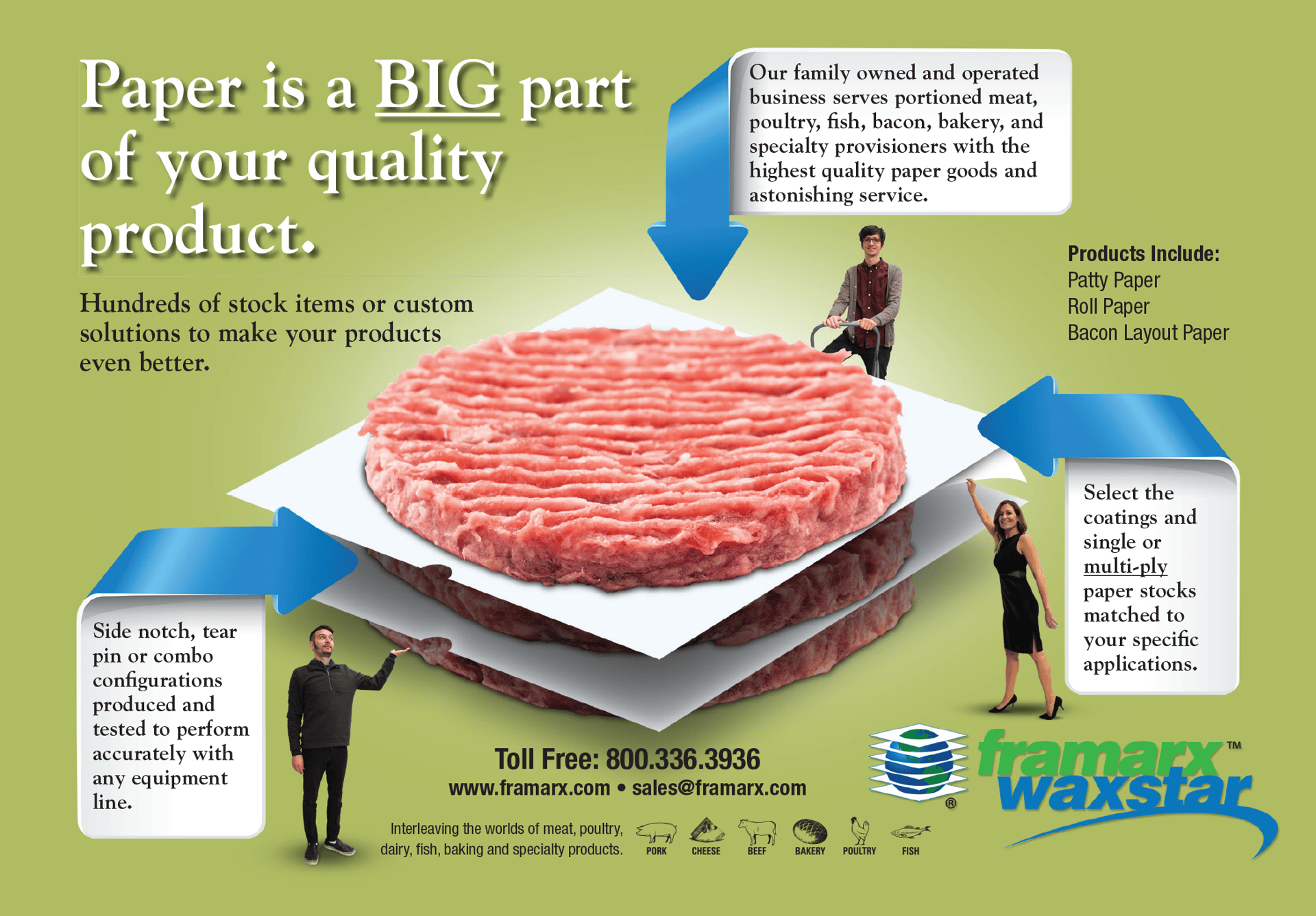commentary
PMMI
sustainability laws
Prepare for
Material phase-outs and bans, EPR rules and demands for a circular economy loom on the regulatory horizon.
The meat, poultry, and seafood industry faces growing hurdles as legislators pass laws and regulators establish rules for more sustainable operations. Action currently focuses on extended producer responsibility (EPR) requirements; bans and phaseouts of single-use plastics, expanded polystyrene (EPS) packaging, and per- and poly-fluoroalkyl substances (PFAS); and mandates related to recyclable and recycled-content materials to support the transition to a circular economy.
EPR laws
EPR laws shift the responsibility of funding the collection, recycling, and management of packaging waste from the government to the manufacturer. Six states have passed EPR laws with California, Colorado, Maine, and Oregon being joined by Illinois and Maryland. Requirements vary. For example, California’s law requires recycled content.
States with EPR laws are moving forward with implementation to meet effective dates ranging from 2025 to 2027, according to AMERIPEN, a material-neutral trade association that educates the industry on the value of packaging. For example, Illinois and Maryland, which passed legislation in 2023, have begun forming advisory councils, and Maryland has chosen the Circular Action Alliance (CAA), a producer responsibility organization, to advise on the required needs assessment. The collaborative group of food, beverage, consumer goods, and retail companies helps producers meet EPR requirements, promotes sustainable practices, and strives to reduce waste and increase recycling rates. The CAA also is working with Colorado and California1.
Although fewer states passed EPR laws in 2023 than expected, many states have bills under consideration or to be reintroduced. AMERIPEN pinpoints the highest activity level in Hawaii, Minnesota, New Jersey, New York, Washington, Michigan, and New Hampshire. Activity at the national level, which would provide uniformity to requirements, doesn’t seem likely to progress until after the 2024 election1.
By Jorge Izquierdo
PMMI

Bans and phase-outs
Single-use plastics, EPS, PFAS and chasing arrows labeling have been the subject of bans and phase-outs.
Countries worldwide are regulating single-use plastics with laws ranging from outright bans to phase-outs and recycling strategies. Although currently targeted primarily at retailers who carry bags and foodservice supplies (e.g., cups, containers, and straws), the momentum against single-use plastics seems likely to broaden and accelerate.
EPS, a material commonly used for trays for meat, poultry and seafood, is the subject of bans in many countries, including Canada and the European Union. Most bans apply to foodservice ware, but others extend to food and beverage packaging. EPS also is regulated by some states and municipalities. Recycling and reuse programs exist for EPS but are not widely available. With these limitations, more nations, states and municipalities will consider banning packaging and food service applications of the material.
Concern about the adverse health effects of PFAS and their long-lived and ubiquitous presence in people and food have prompted regulation of these chemicals, which can disrupt hormones, weaken bones and increase disease risk2. Some laws ban PFAS outright, others ban their use in food packaging. Still, other laws require disclosure of any use of the chemical. Vermont, Washington, California, Maine, New York, Connecticut, and Minnesota are among the first states to pass stringent controls. As other states follow these forerunners, other chemicals and additives also may be regulated3. As a result, suppliers of packaging like grease-resistant paperboard and packaging components like oxygen absorbers are developing PFAS-free alternatives.
Meat, poultry and seafood processors should be particularly conscious of PFAS. A study by researchers at the Keck School of Medicine, University of Southern California, shows that greater consumption of processed meats, particularly hot dogs and pork, is associated with increased levels of PFAS in the body. Higher PFAS levels also were linked to the consumption of tea and other food prepared outside the home2.
Labeling also is coming under scrutiny. In 2021, California passed a labeling for recyclability law, which prohibits the use of the chasing arrows or any other indicator of recyclability on products and packaging unless certain criteria are met. According to AMERIPEN, other states have introduced bills since then, but none have passed. Nevertheless, the group predicts several states will consider labeling legislation in 2024, including for compostability1.
Establishing a circular economy
A circular economy depends on recycled materials used in a similar application. This requires a robust collection and reprocessing infrastructure and a hearty demand for recycled content. So, some legislative bodies are considering bottle bills to boost the collection needed for circularity.
Other legislators are focused on encouraging the use of post-consumer recycled (PCR) content. Although 2023 saw some legislative activity regarding PCR content requirements, the only law passed was Connecticut. It mandates rates and dates for PCR content in plastic beverage containers. Washington state failed to expand its 2021 recycled-content law in 2023 but will likely reintroduce the legislation in 2024. In New Jersey, a recycled-content mandate covering rigid plastic containers, glass containers, paper and plastic carryout bags, and plastic trash bags took effect in January 2024. However, enabling regulations have yet to be approved. So, it’s difficult for brand owners and packaging manufacturers to determine what actions are needed to be compliant1.
Another force pushing interest in circularity is the European Commission’s proposed amendment to its Packaging and Packaging Waste Directive. If approved, this directive would become regulation, set stricter sustainability standards, and encourage greater use of recycled materials.
With all the action on the legislative front, meat, poultry, and seafood processors must be prepared for future regulations and take a proactive stance toward sustainability. PACK EXPO East 2024 (March 18–20, Pennsylvania Convention Center, Philadelphia) is an opportunity for attendees to gain insight into sustainability innovations as well as other timely issues such as cold chain packaging, food safety, robotics, preventative maintenance, and workforce development, life sciences operations.
See innovation in action and discover the latest solutions to packaging and processing challenges at the largest PACK EXPO East to date, which will bring together 7,000 attendees and more than 450 exhibitors, spread out over 100,000 net square feet of exhibit space, offering solutions to more than 40 vertical markets. Meat, poultry, and seafood companies will find the convenient and easy-to-access location ideal for teams to attend, assess the latest technologies, learn from leading industry experts, and make valuable connections to meet current or upcoming projects.
Jorge Izquierdo is vice president of market development for PMMI, The Association for Packaging and Processing Technologies. He oversees PMMI’s market development plans, research and programs for strengthening the competitiveness of North American suppliers of packaging and processing equipment.
- Mohan, Anne Marie. Packaging Legislation Update and 2024 Outlook, Packaging World, Jan. 24, 2024.
- Hampson, Hailey E., et al. Associations of Dietary Intake and Longitudinal Measures of Per- and Polyfluoroalkyl Substances (PFAS) in Predominantly Hispanic Young Adults: A Multicohort Study, Environment International, Feb. 4, 2024.
- Wilkinson, Fred. PFAS-free Oxygen Absorber Aims to Meet Emerging Regulations, National Provisioner, Oct. 19, 2023.
Opening image credit: GettyImages / pcess609 / iStock / Getty Images Plus


